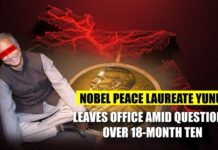Amid the ongoing conflict and humanitarian crisis in Myanmar’s Rakhine State, the proposed “humanitarian corridor” for Rohingya aid and plans to use Chittagong Port have ignited intense political debate across Bangladesh. While the BNP publicly expresses concern over national security and calls for protests, its top leadership’s meetings and mixed messages are creating deep political confusion.
The BNP has long opposed the idea of this corridor, claiming it could seriously endanger the country’s territorial security. Citing this threat, the party even announced major protest programs in Dhaka recently.
Tarique-Khalil Secret Meeting, Yunus-Tarique Drama Raises Eyebrows
At the center of the controversy is a meeting in London between BNP’s acting chairman Tarique Rahman, controversial national security advisor Dr. Khalilur Rahman, and the party’s chief advisor Dr. Muhammad Yunus.
Sources confirm that this meeting lasted nearly 90 minutes, following a separate “secret” meeting on June 11 between Tarique and Khalil at Tarique’s residence. Political analysts suggest the real discussion took place in the secret meeting, while the Yunus-Tarique meeting was more of a media stunt to send political signals.
Further raising eyebrows was the fact that Dr. Khalilur Rahman—not a BNP spokesperson—acted as the main speaker after the meeting and addressed the media. This is particularly ironic, as the BNP had previously accused him of being the architect of the corridor conspiracy.
Is the “Humanitarian Corridor” Just a Political Stage?
On June 15, Supreme Court lawyer Md. Mahmudul Hasan sent legal notices to several government departments demanding emergency humanitarian aid be sent to Rakhine State from Bangladesh. The notice cites the suffering of thousands, including women and children, and warns of famine and disease due to shortages of food, water, and medicine.
The notice argues it is Bangladesh’s constitutional and humanitarian duty to act, urging the government to coordinate with the UN, Red Cross, and other international agencies. It warns that if no action is taken within 10 days, a writ petition will be filed in the High Court.
Khalil’s China Ties and Pakistani Links
What’s happening behind the scenes is equally startling. Before the London meeting, Khalilur Rahman reportedly met with the Chinese ambassador in Dhaka and is planning a visit to China, where he has requested meetings with the Pakistani Army Chief or ISI Director. This proposal was submitted via the Chinese embassy.
Additionally, on the night of June 14, a meeting took place at a house in Dhaka involving Pakistani embassy political officer Kamran Dangal, Hasnat Abdullah, Akhtar Hossain, and others, with retired Colonel Miah Moshiuzzaman (former leader of the People’s Rights Council) present. It’s alleged that an ISI officer attended undercover.
Political Confusion or Backdoor Politics?
Experts say the BNP’s silence regarding the recent legal notice on the humanitarian corridor is suspicious. After years of opposing it, they now seem to support it. This corridor is no longer just a diplomatic or humanitarian matter—it appears to be part of a larger political project. The result? Deep uncertainty surrounding Bangladesh’s national security, foreign policy, and internal politics.





